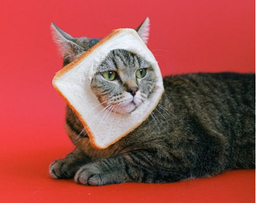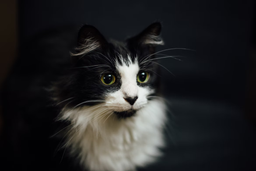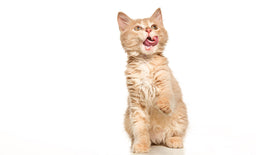Essential oil service—is peppermint oil safe for cats?
Aromatherapy and the use of essential oils is a great way to keep yourself happy and balanced as a human.
What about as a cat, though? Many cat parents experiment by supplementing their cats’ diet with essential oils or using aromatherapy around the house to improve their felines’ wellbeing.
Peppermint oil is touted by many as being an excellent remedy if your cat has fleas and other niggles.
While the intention may be good, you should make sure you are not either feeding your cat something harmful or putting something into the atmosphere that could cause allergic reactions.
Is peppermint oil safe for cats? Read on and get the full picture!

Most cats will run a mile at the smell of peppermint oil.
Source: Pixabay
Why do cat owners try aromatherapy?
Aromatherapy and essential oils are understood to have many beneficial effects for humans and are used both topically as dietary supplements and as air fresheners.
Some cat parents swear by the effect that essential oils have on them and assume that the benefits will be the same for cats.
In humans, peppermint oil is used to alleviate muscle or stomach pain, clean teeth, and deter insects.
Advocates of essential oils for cats claim they can have a beneficial effect on:
- Digestive system disorders, such as irritable bowel syndrome (IBS) and constipation
- Teeth and gum health
- Skin condition, shedding, and hairballs
- Flea and insect infestations
While it may be true that essential oils can have these effects on humans, cats are different.
Many essential oils—peppermint included—are actually toxic to felines.

Do NOT try this at home!
Source: Pixabay
Is peppermint oil toxic to cats?
Peppermint oil is highly toxic to cats.
While humans can safely digest peppermint oil, cats lack the liver enzymes to break down the phenols it contains. Phenols are organic compounds that are similar to alcohol but have a higher boiling point and resistance to breaking down. They are typically strong-smelling and make up the active ingredient in many essential oils, such as peppermint oil.
Without the enzymes required to break down phenols, cats exposed to peppermint oil can experience:
- Liver damage
- Breathing difficulties
- Wobbliness and seizures
- Digestive issues
Liver damage
A cat’s liver is delicate and only designed to function if the nutrition they receive is based on what they would eat in nature.
Ingesting peppermint oil can cause major damage to your cat’s liver, the only treatment being extensive medication and a strictly controlled diet.
Breathing difficulties
Cats don’t need to eat peppermint oil to be affected by it.
Inhaling peppermint oil spread in your house by a diffuser can be enough to cause your cat to suffer from:
- Laboured breathing
- Coughing fits
- Shortness of breath
While the symptoms should disappear after the cause is removed, prolonged exposure to peppermint oil in the air can lead to permanent airway damage.
Wobbliness and seizures
Peppermint oil is known to attack a cat’s nervous system.
If your cat ingests peppermint oil, you may notice:
- Muscle tremors
- Difficulty walking without wobbling
- Seizures in extreme cases
Digestive issues
Peppermint oil can cause food poisoning and major disruption to your cat’s digestive tract.
If you haven’t noticed any symptoms before the oil reaches the stomach and gut, you will almost certainly have to deal with:
- Vomiting and nausea
- Diarrhoea
- Potential rapid weight loss
Weight loss may occur if your cat’s digestive problems last more than 24 hours. At this point, you need to act quickly as your cat mobilising fat reserves can quickly cause hepatic lipidosis (fatty deposits around the liver). This is serious and requires long-term rehabilitation to restore full liver function.

Even diffusers can emit tiny droplets of peppermint oil.
Source: tashka2000
Is peppermint oil bad for cats in spray or diffuser form?
You may think that it’s safe to use peppermint oil as long as your cat doesn’t eat it.
This is false logic as using peppermint oil sprays or diffusers can also harm your cat, namely by your cat:
- Licking a patch of fur—Peppermint oil sprays and diffusers may release tiny droplets of the oil into the air. Some of these may land on your cat, and your feline may be tempted to lick the affected spot to get rid of the matting or smell. Even tiny amounts of peppermint oil can cause a toxic reaction
- Absorbing oil through the skin—Cats have relatively thin skin that will absorb peppermint oil if it is allowed to remain in the fur. Even though you may think you have been circumspect and checked your cat for any signs of contamination, the effect may only become evident a day or so later, by which time you will need to get your cat to the vet as quickly as possible
Cats are also highly curious when it comes to trying new food and may want to investigate essential oil bottles while you are not looking.
The good news is that most cats shy away from the smell of peppermint, so it is unlikely that they will take a speculative lick. For complete peace of mind, you should make sure all the products in your household that contain peppermint oil are kept well away from prying feline eyes.
When’s the time to visit the vet?
If you notice any of the following symptoms and know that you have peppermint oil products in the house, you should get your cat to the vet quickly as possible:
- Wheezing
- Staggering or muscle tremors
- Digestive issues or throwing up, even if other behaviour is normal
- Retching
- Drooling
- Redness around the mouth
- Lethargy
- Pawing at the face
- Watery eyes
If peppermint oil and cats don’t mix, how do you keep your cat healthy?
Most of the issues that peppermint oil claims to positively affect can be addressed with good nutrition.
Cats are obligate carnivores, so their bodies function best if they are fed on:
The benefits of animal protein in a cat’s diet
Animal proteins give your cat the right combination of amino acids—like taurine—needed for:
- Healthy muscle build
- Skin and coat maintenance
- Efficient organ function
If your cat’s food contains a high proportion of animal protein, this will have a beneficial effect on many of the areas those not in the know recommend essential oils for.
Meat is the most digestible form of protein you can give your cat—all types of meat are considerably more digestible for felines than plant protein, as evidenced by the biological value (BV) of common protein sources. The BV measures the efficiency with which cats can metabolise protein, and the BVs of many common proteins are:
|
Protein type and source |
BV |
|
Animal protein: |
88%–98% |
|
Vegetable protein: |
45%–68% |
If your cat food of choice delivers most of its calories through high-quality meat, you are more likely to have a cat with healthy skin, lithe body, and efficient immune response.
High-quality protein can also help your feline avoid many of the typical niggles cats suffer from, such as:
- Urinary tract infections (UTIs), like cystitis and bladder stones
- Diabetes and pancreatitis, by avoiding the carbs that can often cause blood sugar disorders
- Weight management problems often caused by too much unhealthy food or diets that are not grain-free
- Excessive hair loss through grooming leading to constant issues with hairballs

Meat and fish are the healthiest main ingredients for your cat!
Image (c) Untamed
Why is animal fat important?
Animal fat is an excellent secondary source of calories but also delivers essential fatty acids, such as:
- Linoleic acid
- Arachidonic acid
- Omega-3 and omega-6 acids
These help a cat’s body maintain and repair cell structure, meaning that diets rich in animal fat often result in cats with healthier skin and fast-healing injuries.
This is particularly important if your cat is susceptible to:
- Fleas
- Mites
- Viral skin infections
Rather than reaching for peppermint oil, you should make sure your cat food is rich in animal fat to promote fast skin repair.
Besides delivering the right balance of vitamins and minerals, animal protein and fat are the best way to make essential oils like peppermint oil unnecessary.
How to recognise good cat food
Whatever type of food you choose—wet, semi-moist, dry, or raw—you should check the label to make sure:
- The ingredients list has meat in the first place, no grains or fillers, no artificial additives, and a short line-up of ingredients you can recognise
- The guaranteed analysis tells you that the product contains:
- 50% protein
- Up to 20% fat
- Less than 3% carbs
Is Untamed healthy for your kitty?
Untamed cat food is made of exactly the constituents your cat has evolved to thrive on.
We understand what cats need and love and our products deliver just that with:
High quantities of meat
With twice the amount of animal protein than you find in most commercial cat foods, your kitty will go wild about the amazing taste of Untamed.
Our products—like Chocka Chicken, Tuck-In Tuna, or Full-On Fishy—are all highly nutritious and suitable for:
- Kittens, to promote healthy growth and avoid digestive niggles
- Pregnant queens, whose energy needs are huge
- Adults, to maintain health and avoid weight gain
- Seniors, who need the healthiest food to keep their weight up and stay fit and interested in their meals
With this much meat in each tin, we’re confident that even the fussiest of cats and those that normally turn up their noses at wet food will love Untamed!
Vet-formulated recipes
Every Untamed recipe has been developed by vets to ensure that your feline gets nothing but the best.
Our products are:
- Free from known allergens
- Made from the highest-quality ingredients
- Suitable even for sensitive cats
No matter what breed your kitty is—Maine Coon, Siamese, Bengal, Persian, Ragdoll, or British Shorthair—Untamed has the right diet for your feline.
Ethical production and logistics
Untamed is committed to keeping our planet, as well as your cat, as healthy as possible.
We make sure our entire supply chain is sustainable and carbon neutral by:
- Only sourcing meat and fish from cruelty-free suppliers
- Ensuring our packaging is 100% recyclable
With all this on offer for your feline, all you need to do now is try Untamed and watch your kitty thrive!

All your kitty needs for a happy and healthy life!
Image (c) Untamed
Get Untamed delivered to your door
Getting Untamed for your kitty is so easy—follow these steps to order our cat food online:
- Give us some info about your feline friend
- Choose your feline’s tailor-made meal plan
- Order a trial pack online
Once your trial pack arrives, you can explore how your cat reacts to the taste of Untamed food and decide which variants get the biggest claws-up. We offer the best cat food delivery subscription to make sure you don’t run out of your kitty’s new fave.
What to expect after switching to Untamed
Happy Untamed cat parents report that you should start seeing the effect in no time, namely:
|
Timeline |
What Untamed can do |
|
Within a week |
You should see your cat perk up, and you may notice less mess in the litter tray |
|
After two months |
You will hopefully notice your feline being more playful and full of energy |
|
Within four months |
Your cat’s coat should start to shine, and you may notice fewer hairballs |
|
For life |
Your feline should remain sleek, active, and contented, even in later years |
Check out our other guides to what cats can or cannot eat:
|
|

![Best food for Ragdoll cats in the UK [Broken Down]](http://untamed.com/cdn/shop/articles/featured_best_food_for_ragdoll_cats_uk.jpg?v=1646818249&width=256)

